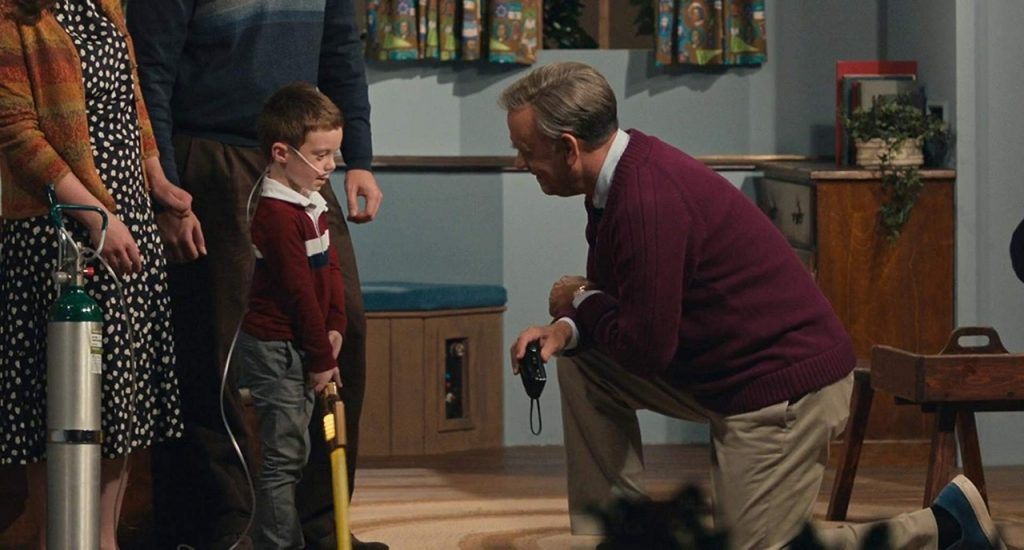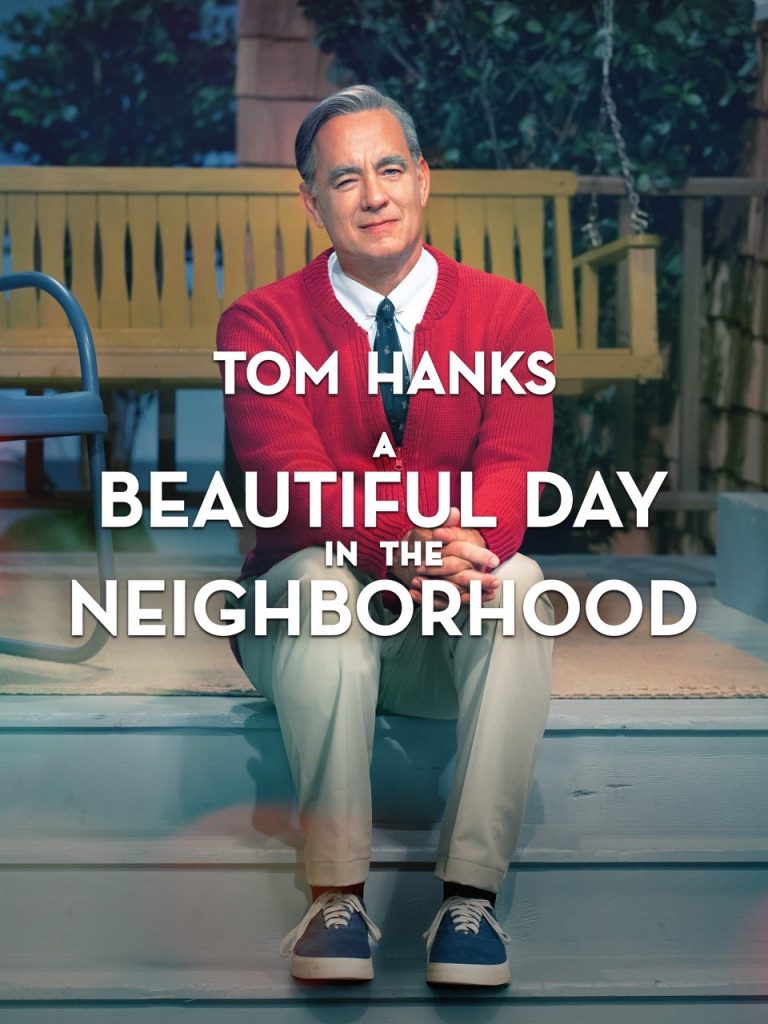Oscar Nominations:
Supporting Actor (Tom Hanks)
I am of the right age to have missed the Mister Rogers Neighborhood television show. Although there was an earlier version of the show that started in 1962, the famous show of that name did not air until 1968, when I was in high-school and, of course, well past watching ‘kids TV’. The series went on, however for thirty-one more seasons, finally ending in 2001. (Fred Rogers died shortly after of stomach cancer). Conceivably, my daughters, born in ‘89 and ‘91 could have watched the show, although I don’t remember them talking about it. Unfortunately, I didn’t watch much TV in the 90s.
Too bad, actually, because the show has developed a cult following among thousands of people who grew up with the show, or whose kids have. The show, originally on NET and then PBS, has received multiple awards and is considered an exemplary model of ‘good television’, especially for younger audiences. All of this, however, has happened beyond my awareness.
It appears that the loss is definitely mine. A Beautiful Day in the Neighborhood is a movie that is sort of about Fred Rogers, but it probably shouldn’t be counted as revealing all that much about the man – it is not really a ‘biopic’ in the conventional sense. Instead, this movie is about the effect that the man had on other people, specifically a cynical writer for Esquire magazine. In the movie, the writer, Lloyd Vogel, is assigned the job of writing a 400-word fluff piece on Mr. Rogers that is to be part of an Esquire issue dedicated to modern American ‘heroes’. Vogel, resisting the assignment, soon discovers that there is much more to the man than he – or maybe anyone who doesn’t know the man – can possibly understand. Instead of writing a 400-word fluff piece, he ends up composing a 10,000 word essay that is probably one of the best pieces the writer ever created. More importantly, Rogers changes Vogel’s life in significant ways that Vogel never understood was possible. He ends up becoming life-long friends with Rogers and alters his life in many, very important ways.
If all that sounds like movie-magic puffery, well, some of it is – there are storylines in the movie that are definitely artifacts of the writers’ and director’s imagination. But I think it is telling that the main thrust of the movie is 100% true. There was a man writing for Esquire magazine, although his name was Tom Junod. And he was assigned to do a fluff piece about the TV personality. And he did end up writing a magnum opus essay that was, indeed, the cover-story for Esquire magazine in the November, 1998 issue. Apparently, it is not true that Mr. Junod had some serious problems with his Father, as portrayed in the movie, but it is true that Fred Rogers permanently changed the writer’s life and they maintained their friendship right up until Rogers death.
And so this movie is more about the life of Vogel/Junod than it is of Fred Rogers. But it is clearly about the unnatural effect that Rogers had on other peoples’ lives. One can only say that his impact was profound. As Vogel finds, as he explores the man, there is absolutely no difference between the man on the TV screen and the man sitting on the sofa answering his questions. Try as much as Vogel could to get ‘beneath’ the facade, there was only another layer of what he had already seen – there was no facade! The cynical writer was used to seeing humanity’s dark side and was totally unprepared to find someone who was actually more interested in empathizing with the interviewer than in responding to his queries. Vogel had never encountered that kind of response, was totally unnerved by it, and, as a result, ended up experiencing some epiphanies of his own that fundamentally changed his relationships and his viewpoint on the world.
But this is a movie review – not a review of Fred Rogers life – as if that could be done. So how does the movie achieve this amazing empathic response?
For one thing, they get Tom Hanks to play Mr. Rogers. As one critic wrote, it was ‘America’s Hero playing America’s Saint’. If there is anyone who could credibly play the character it would have to be Tom Hanks – the same man who gave us such meaningful characters as Forrest Gump (Oscar winner), Chuck Nolan (Cast Away – Oscar nominee), and Captain Miller (Saving Private Ryan – Oscar nominee). If any actor can fall back on a reservoir of human ‘goodness’ then it has to be Mr. Hanks. (He was also one of the very first actors to advise Americans that he and his wife were infected with the Coronavirus, making it clear that the virus could strike America anywhere.) Hanks performance in this movie is outstanding and deserving of the Oscar nomination.
Although Hanks was the only person nominated for an Oscar in this movie, I also have to mention the director, Marielle Heller. Heller has not been nominated before, but immediately before this movie, she directed one of my favorites from the 2019 Oscar season, “Can You Ever Forgive Me?”. Another riveting story of imperfect humans struggling to overcome pain and find a place in the world. She did a great job with Melissa McCarthy – and I gave that movie 4 stars. She is a great story-teller, with a knack for exposing the humanity beneath the superficial surfaces. We should expect to see more from her in the future.
There are many ways that the movie is crafted to drive home the points she is trying to make. For one, the entire movie is structured pretty much just like an episode from the TV show. Mr. Rogers (Hanks), starts the movie by taking off his street shoes and sport coat, and putting on his sneakers and his cardigan button sweater. And he sings ‘A Beautiful Day in This Neighborhood’. He then goes to a ‘picture board’ where he opens windows exposing pictures of characters in the show – one of whom is Mr. Vogel. That introduces today’s story. In the middle of the movie there is a ‘dream sequence’ where the characters are transported to a fantasy world, much like the characters in the show. Transitions between scenes are managed much like in the TV show, with displays of miniature buildings, vehicles, and people all moving around from one location to another. And, of course, the movie ends with Mr. Rogers changing his shoes and sweater, putting closure on the movie, as in a TV episode.
This was a very effective movie and I will be very surprised if viewers aren’t brought to tears, even if you did not grow up with the TV show. The film communicates so well the empathy of this man that it is very difficult not to feel it. But if, for some reason, you need more, then read the Esquire article on which the story is based – just search for “Can You Say…Hero” by Tom Junod. After reading his story, and watching the movie, it is even more difficult to deny the truth that Fred Rogers might be the most honest TV image of a man ever created. That will make you cry. (4 Stars, maybe 4.5 – this was a definite surprise!)


